Rauan: Seattle’s a polite town. Everyone’s super polite, cordial, in a way, cool in their dealings. But not so warm all the time. Seldom even maybe. What do you think of this? And do you think Seattle’s writing (poetry, etc, whatnot) suffers and/or benefits from a similar sort of politeness? Coolness?
Rebecca: Seattle used to be considered a “friendly” town but Seattle grew up and is now a Big City. Seattle suffers from a kind of passive/aggression. I’ve seen people at six way stops get out of their cars and start fighting over who goes first. We also have a lot of homeless displaced people here but they are mostly ignored or hidden so the city will look prettier. Seattle is famous for leading the way in cutting down its carbon footprint but the city’s largest private employer makes airplanes. No one (at least publicly) acknowledges how jet fuel which emits carbon dioxide and other greenhouse gases into the atmosphere at an alarming rate contributes to the acceleration of global warming. And yet you can no longer get paper or plastic bags at Seattle stores because it’s bad for the environment.
Seattle writers are friendly among themselves those writers who write similar poems those writers who are polite whose poems are polite whose work doesn’t take risks whose poems are widely published in polite poetry journals. It’s an easy place to be a poet. You can’t swing a contrabassoon without hitting a poetry reading in Seattle. This city has supported poetry on buses poetry readings for the city council poetry readings in museums and offers all kinds of grants and opportunities to poets who write polite non-threatening poetry. Sometimes Seattle gets lucky and brings in outside poets to read but mostly it’s the same circle of poets making the rounds being passive aggressively nice with their nice natural fiber clothes their hybrid cars their little hemp bags in which to put their shopping and their polite nice poetry.
*****
*****
Okay, so that was the first part of my latest Seattle Author Spotlight, the 11th, featuring Rebecca Loudon. Several years I did an interview with Rebecca regarding her excellent book Cadaver Dogs (which you can read here, it contains info about her being a violinist as well as some of the very personal elements of that book) but this time I had the pleasure of meeting Rebecca in person. Rebecca claims to be a sort of hermit, but we got along great, intensities coming and going. And Rebecca’s work as I’m finding out is getting stranger and stronger and I can’t wait for her book which she’s currently working on.
So, anyways, to follow is the rest of my interview with Rebecca. A brief bio Rebecca’s provided can be found at the end of the interview.
*****
RK: For over 11 years you were a mainstay of a local writers group that regularly met to, among other things, workshop poems. But now you’ve cut ties for the most part (or completely?) with local writing groups and communities. Can you tell us a bit about that and whether you’re yearning to get back into groups?
RL: I have considered restarting the writing workshop I held with different ground rules. For one thing the workshop would have an end date. At the end of teaching my previous workshop I became aware that the workshop itself had become the impetus for the writing. The writers had not brought poetry into their hearts like Jesus. They were waiting for prompts rather than using their imaginations. I suspected they might have been there for the food. I’m a very good cook. If I start another workshop I won’t feed them. Also I struggled with getting the poets to review books and to critically read poems. They seemed to float inside the niceness paradigm even after my reminding them year after year that I like this line is not actually a critical read. As far as bringing my own poems to a workshop environment I have discovered that this system does not work for me. I need to hammer the poems out myself without the cheese and wine community asking me what the hell I’m doing.
RK: Your manuscript-in-progress, Queer Wing-ed, is built around Henry Darger and one of its main thrusts, I think, is to explode the mainstream sense that Darger was an innocent, feeble-minded, an Art Brut. Could you please discuss a bit?
RL: In 2011 I was awarded a fellowship to study at the Intuit Gallery in Chicago where all of Henry Darger’s manuscripts exist on microfiche. I read his autobiography his weather reports and the book he wrote that no one in the Henry Was A Saint camp seems to want to discuss Further Adventures In Chicago: Crazy House in which Henry brings the Vivian Girls to his Chicago apartment and has explicit sexual “adventures” with them. I believe the Cult of Henry Darger has been manipulated because of the money his paintings are making. When I was inside Henry’s works looking at his tidy handwriting his good spelling his clear intelligence and walking around his apartment which has been meticulously replicated in the Intuit it was clear that this was no innocent this was no mad man without knowledge of art. It is clear from his autobiography that Henry was abused as a child as he was placed in the Illinois Asylum For Feeble-Minded Children a nightmarish institute at the turn of the century when those institutions were “terrifying dark places where children received little or no privacy, and molestation was the standard” (The History and Influence of the American Psychiatric Association—Walter E. Barton 1987.) Once I read the above (eye-opening and alarming) texts I began to write about Henry Darger as a an interrogation seeking a way through my poetry to rescue the Vivian Girls (and in turn all abused children) from their captors.
RK: To give our readers a taste of your new poems could you please give us one of the Queer Wing-ed poems ?
RL:
Traumnovelle
ammonia all around their lithe stains
the corners of Hettie’s mouth
the corners of Joice’s hankydab
amused like kittens
I were mostly invisible
Joice counted 10
sandals unstrapped once you’re on the trolley
you have to stay insidethere were rumors
nothing to report from the meadow
Hettie and Joice rode the carousel
hunted the flappity flap tent’s billow sides
squealed or laughed invisible
after dark I watched
my dangle scissor eye
my glint eye opened and closed
a reeking genius a real zingerquasi una fantasia
spindle-shanked and feathered
pulled their curls grunted girlsoupgirlsoup
liver dumpling girls
round and round their transparent eyelids
tripsy shot through with blood linesthis morning muscle-bound in a fur hat
bristled edges sucked out the light
MY dream afterall MINE dressage and kewpies
an amphitheater where 2 girls
spun and rolled and showered me with boiled peanuts and beer
sugar-coated dresses dull
as a horse’s blanket a brigand horse a cluttersack
rotted between his legs I made them look
simply to possess the underneathurine soaked hospital beds is all seriousness
are you CLEAN CLEAN CLEAN?
no sound reached the outside world
Hettie and Joice pulled their faces to their knees
I built a wasp nest from newspapers
spit and hair
RK: You were allowed access to Darger’s archived work, his manuscripts, Art, etc, and to explore his apartment all day long for about a week, I think. Can you tell us what this was like? (Any particularly interesting insights, discoveries, etc).
RL: I answered a lot of this in the third question. I’d like to add that being in Henry’s room freaked me the fuck out being around his stuff his ephemera his weird tableaux of pictures of little girls turned away from pictures of the Virgin Mary his numerous plaster dogs the books he read the way books take on the personality the smell of their owners after a number of years the music he listened to his rather mean sense of humor his anger his rage. That room is permeated with shrill weirdness.
RK: Johannes Göransson included one of your Queer Wing-ed poems in a discussion about “ambient” violence which appeared on the Poetry Foundation’s blog and when I asked you what you thought about “ambient” violence in relation to Art, yr Art, etc, you said you agreed completely with Johannes because you could feel Henry (Darger) talking inside you. Can you elaborate a bit about violence, Art, whatever, plz?
JG: Johannes wrote of ambience in poetry as something that overwhelms us that immerses us that drop kicks us right into the ocean of art. That is an act of violence. Oddly enough after my last reading of these poems I was told by a listener that my poetry became the ambient space in my head that it was disturbing to her and she thought that in the reading I was becoming my subject inhabited by him. She didn’t use the word violent but that is what she was getting at. And writing these poems has been extremely difficult because I have felt inhabited by Henry Darger. His paintings are violent to the extreme. His writing is violent. I hear his voice in my head as a peculiar voice not my own. It has taken me a long time to write these poems not only because of the amount of research I’ve done but because of how uncomfortable I am letting Henry run free in my head to tell his story in his own voice which for me is the only way to get to the outcome of my quest.
RK: To give our readers a 2nd taste of your new poems could you please provide us a 2nd of your Queer Wing-ed poems?
RL:
Young corn grows right up to the shore
a giant broody hen watched as one boy
kissed another glorious on the cheek
a good joke like a johnnycake or Nazis
those brayers water came over the berm
you wait then if you think I held back
I floated the children at night
in the drainage ditch past the grind
house theaters sniffed out the enemy
stepped on them barefoot pissed
on the comforters
swam the luminaire babies head to toe
to head boys and girls along the ditch’s
V shaped edges blond water lilies
floated their skin sacks
scraped knees and hush some blood
it was practice for later SACRIFICE
and Sick-A-Bed-Sally
bristly sedge ribbons duck shit I floated them
in circles each head bobbed up and down
dresses and pants ballooned like parachutes
then settled then opened again
RK: At one of your most recent Seattle readings (a Caroline Kennedy event) you read a poem which called for you, at several points, to bark like a dog. How did this go over?
RL: I may have succeeded in waking up the audience. As I usually run away after readings I didn’t stop to hear anyone’s opinion of my barking except for my brother who loved it and my son who was kind of horrified. I barked at Dartmouth just last week though and no one seemed to mind.
RK: What do you think of Poet Laureates?
RL: For some reason it always seems like the Poet Laureates have money to begin with. Why can’t they choose a poor poet instead? In Washington our Poet Laureate is a poet who writes polite poems and invites other polite poets to Poet Laureate type events. The poets I think of as The Usual Suspects. I have yet to be invited to one of these readings and/or events even though the Poet Laureate in question knows me quite well. She was at the barking reading though and that may have been the last straw for her.
***
Brief Bio:
Rebecca Loudon lives and writes in Seattle. She is the author of three collections of poetry, Tarantella, Radish King, and Cadaver Dogs, and two poetry chapbooks, Navigate, Amelia Earhart’s Letters Home, and TRISM. Radish King was nominated for the Pulitzer Prize in poetry. She is a professional musician and teaches violin lessons to children.
***
Previous Spotlights
Tags: Rebecca Loudon, Seattle Author Spotlight



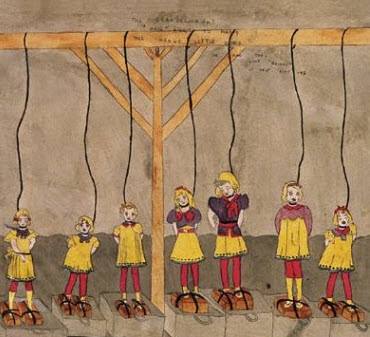
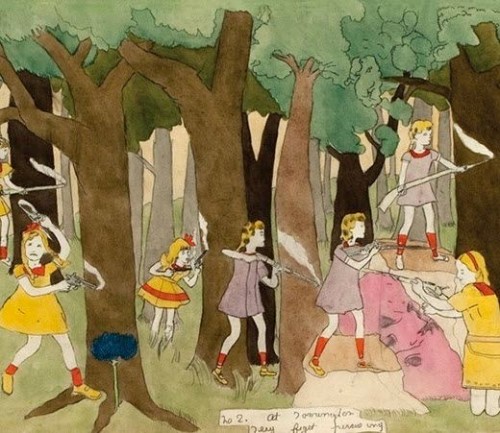
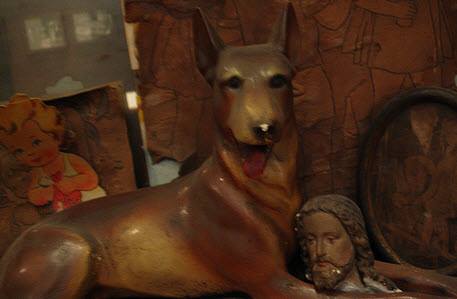
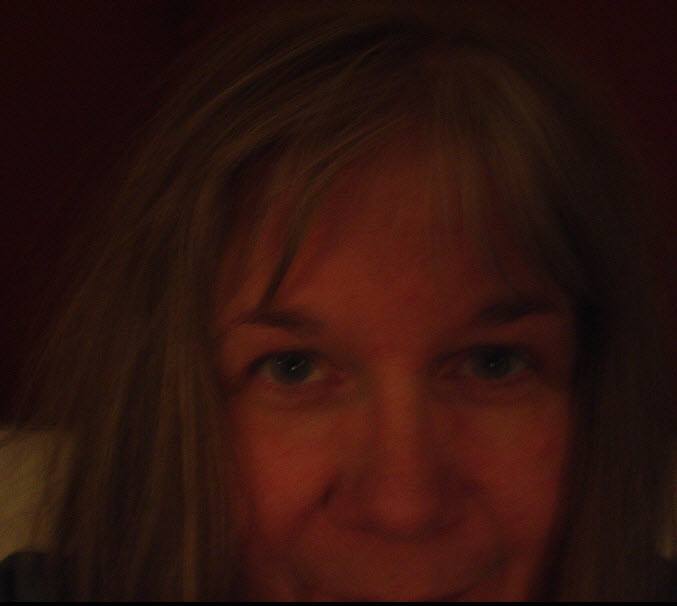
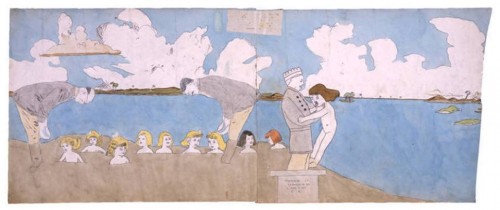
I was a Poet Laureate in Washington (well, just of a city) and I will go on record as saying I loved Rebecca’s poetry, especially the barking.
Yay! Rebecca Radish!
xoxoxooxo
I cannot wait for Queer Wing-ed to be published. These poems are telling us something important about Darger about us and I want to know more inspite of the ‘ambient violence’ which really is life as the poem says “I made them look simply to possess the underneath” and who better to make us look than RL. Thanks for this interview RL and RK.
[…] Rebecca Loudon […]